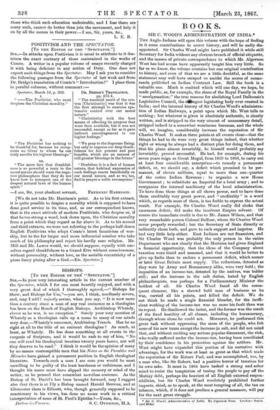POSMVISM AND THE SPECTATOR.
[To THE EDITOR OF THE "SPECTATOR."]
SIR,—In attacks upon Positivism it is usual to attribute to it doc- trines the exact contrary of those maintained in the works of Comte. A writer in a popular volume of essays recently charged it with being deficient in any notion of Duty. One does not expect such things from the Spectator. May I ask you to consider the following passages from the Spectator of last week and from Dr. Bridge's translation of Comte's " Introduction?" I place them in parallel columns, without comment :—
Da. Blames TnAnst-imor, pp. 3734.
"The essential merit of the sys- tem [Christianity] was that it was the first attempt to exercise sys- tematic control over our moral nature."
"Christianity took the best means of effecting its purpose that were then available, but it was not successful, except so far as it gave indirect encouragement to our higher feelings."
"We pray to the Supreme Being, but only to express our deep thank- fulness for her present and past benefits, which are an earnest of still greater blessings in the future."
"Doubtless it is a fact of human nature, that habitual expression of such feelings reacts beneficially on our moral nature, and so we, too, find in prayer a noble recompense."
deepest natural laws of the human spirit."
°Spectator, March 16, p. 303.
"—The Positivist, who most despises the Christian morality."
IL
"The Positivist has nothing to be thankful for, because he recog- nizes no Giver to whom he can truly ascribe his highest blessings."
"The mere fact that thankful- ness is so powerful a tonics to the moral nature should warn the nega- tive philosophers that they do not know how to interpret one of the
—I am, Sir, your obedient servant, FREDERIC HARRISON.
[We do not take Mr. Harrison's point. As to his first extract, it is quite possible to despise a morality which is supposed to have done good service in its time, and, as our correspondent knows, that is the exact attitude of modern Positivists, who despise or, if that be too strong a word, look down upon, the Christian morality from a point which they regard as far above it. As to his second and third extracts, we were not referring to the perhaps half-dozen English Positivists who adopt Comte's latest fanaticism of wor- ship, but to the far larger and more influential number who take much of his philosophy and reject his hardly sane religion. Mr. Mill and Mr. Lewes would, we should suppose, equally with our- selves regard thankfulness to a Grand Etre without consciousness, without personality, without love, as the amiable eccentricity of a pious fancy pining after a God.—En. Spectator.]






























 Previous page
Previous page